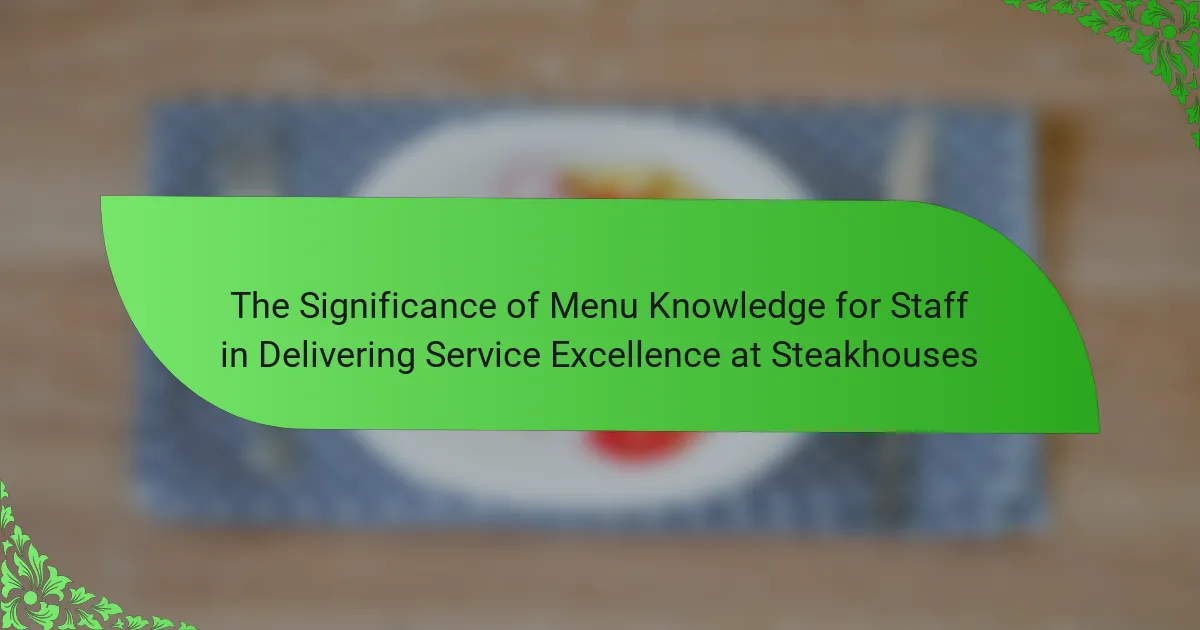Menu knowledge is the essential understanding of a restaurant’s offerings, including ingredients, cooking methods, and dietary considerations, particularly for staff in steakhouses. This knowledge enables servers to make accurate recommendations, enhancing customer satisfaction and trust. Studies indicate that well-informed staff can significantly boost sales and improve customer retention, with knowledgeable servers potentially increasing sales by up to 20%. Effective training programs that include detailed menu descriptions, tastings, and role-playing can further develop staff expertise, ultimately leading to service excellence and a superior dining experience for patrons.

What is the significance of menu knowledge for staff in steakhouses?
Menu knowledge is crucial for staff in steakhouses. It enables servers to provide accurate recommendations to customers. Knowledge of ingredients and cooking methods enhances the dining experience. Staff can answer questions about dietary restrictions effectively. This builds customer trust and satisfaction. Menu familiarity can lead to increased sales through upselling. According to a study by the National Restaurant Association, knowledgeable staff significantly improve customer retention. Overall, menu knowledge directly impacts service excellence in steakhouses.
Why is menu knowledge essential for delivering service excellence?
Menu knowledge is essential for delivering service excellence because it enables staff to provide informed recommendations. When employees understand the menu, they can answer customer questions accurately. This builds trust and enhances the dining experience. Knowledgeable staff can suggest pairings and highlight specials effectively. Research shows that informed recommendations can increase customer satisfaction and sales. A study by the National Restaurant Association indicates that 70% of customers appreciate staff who can offer detailed menu insights. Therefore, strong menu knowledge directly correlates with improved service quality and customer loyalty.
How does menu knowledge enhance customer experience?
Menu knowledge enhances customer experience by enabling staff to provide informed recommendations. When servers understand menu items, they can suggest dishes that align with customer preferences. This personalized service fosters a connection between staff and patrons. Knowledgeable staff can answer questions about ingredients and preparation methods. This transparency builds trust and confidence in the dining experience. Studies show that customers are more satisfied when they receive tailored suggestions. Enhanced satisfaction can lead to repeat business and positive word-of-mouth. Overall, menu knowledge is crucial for delivering exceptional service in steakhouses.
What role does menu knowledge play in staff confidence?
Menu knowledge significantly enhances staff confidence. When staff understand the menu, they can provide accurate recommendations. This knowledge empowers them to answer customer questions effectively. Confident staff create a positive dining experience. Research shows that knowledgeable employees increase customer satisfaction. A study by the National Restaurant Association indicates that well-informed staff boost sales. Thus, menu knowledge directly correlates with staff confidence and service quality.
What are the key components of menu knowledge?
The key components of menu knowledge include understanding menu items, ingredients, preparation methods, and pairings. Staff must be familiar with each dish’s flavor profiles and presentation. Knowledge of dietary restrictions and allergens is essential for customer safety. Additionally, staff should be aware of specials and seasonal items. This comprehensive understanding enables staff to make informed recommendations. Research shows that knowledgeable staff enhance customer satisfaction and increase sales. For instance, a study published in the Journal of Hospitality & Tourism Research found that menu knowledge significantly impacts the dining experience.
What types of information should staff know about the menu?
Staff should know the ingredients and preparation methods of each menu item. This knowledge allows staff to answer customer questions accurately. Staff should also understand dietary restrictions and allergen information. This ensures they can assist customers with specific dietary needs. Familiarity with portion sizes is important for managing customer expectations. Staff should be aware of the menu’s seasonal items and specials. This helps in promoting featured dishes effectively. Additionally, knowing the origin of key ingredients can enhance the dining experience. Understanding pricing and pairing recommendations can improve customer satisfaction and sales.
How does understanding ingredients contribute to service quality?
Understanding ingredients enhances service quality by enabling staff to provide informed recommendations. Knowledge of ingredients allows employees to answer customer inquiries accurately. This expertise fosters trust and confidence in the dining experience. Customers appreciate when staff can describe flavor profiles and preparation methods. Furthermore, ingredient knowledge aids in identifying potential allergens, ensuring guest safety. A study by the National Restaurant Association highlights that knowledgeable staff can increase customer satisfaction by up to 20%. Therefore, understanding ingredients is crucial for delivering exceptional service in steakhouses.

How can menu knowledge impact service delivery in steakhouses?
Menu knowledge significantly enhances service delivery in steakhouses. Staff with comprehensive menu knowledge can provide accurate recommendations. This leads to improved customer satisfaction. Customers appreciate informed suggestions about steak cuts and cooking methods. Knowledgeable staff can also address dietary restrictions effectively. This responsiveness fosters trust and loyalty among patrons. Studies show that well-informed servers can increase sales by up to 20%. Furthermore, menu knowledge minimizes order errors, which enhances the overall dining experience.
In what ways does menu knowledge influence customer decisions?
Menu knowledge significantly influences customer decisions by enhancing their dining experience. When staff possess in-depth knowledge of the menu, they can provide tailored recommendations. This leads to increased customer satisfaction and repeat visits. Studies show that knowledgeable servers can boost sales by up to 20%. Customers are more likely to order higher-priced items when they receive informed suggestions. Furthermore, menu knowledge fosters trust between customers and staff. This trust encourages customers to try new dishes, enhancing their overall experience. In conclusion, menu knowledge directly impacts customer choices, satisfaction, and restaurant revenue.
How can staff recommendations enhance dining experiences?
Staff recommendations enhance dining experiences by providing personalized guidance to customers. Knowledgeable staff can suggest dishes based on individual preferences. This tailored approach increases customer satisfaction. Recommendations can also highlight signature dishes that showcase the restaurant’s strengths. For instance, studies show that diners are more likely to try new items when recommended by staff. Additionally, recommendations can create a connection between staff and diners, fostering a welcoming atmosphere. Overall, informed suggestions lead to a more enjoyable dining experience and can encourage repeat visits.
What are the consequences of lacking menu knowledge?
Lacking menu knowledge can lead to poor customer service. Staff may struggle to answer questions about dishes. This results in customer frustration and dissatisfaction. Inaccurate recommendations can harm the dining experience. Customers might feel undervalued if staff cannot provide information. This can lead to negative reviews and loss of repeat business. According to a study by the National Restaurant Association, informed staff improve customer satisfaction. Menu knowledge enhances the overall dining experience and boosts sales.
How does menu knowledge relate to upselling and cross-selling?
Menu knowledge directly enhances upselling and cross-selling by enabling staff to suggest complementary items effectively. When servers are well-informed about the menu, they can recommend higher-priced or additional items that pair well with customers’ initial choices. This targeted approach increases the average check size. For instance, a study by the National Restaurant Association found that knowledgeable staff can boost sales by up to 20% through effective recommendations. Additionally, menu knowledge allows staff to answer customer questions confidently, fostering trust and encouraging customers to try new items. This dynamic not only improves customer experience but also drives revenue growth for the establishment.
What strategies can staff use to effectively upsell menu items?
Staff can effectively upsell menu items by utilizing menu knowledge and engaging with customers. Understanding the menu allows staff to highlight unique dishes and pairings. They should suggest items based on customer preferences and dietary restrictions. Personal recommendations create a connection and enhance the dining experience. Offering limited-time specials can create urgency and encourage purchases. Staff can also use descriptive language that evokes taste and presentation. Training in upselling techniques has been shown to increase average check sizes significantly. According to a study by the National Restaurant Association, effective upselling can increase revenue by up to 20%.
How can cross-selling improve overall sales in a steakhouse?
Cross-selling can significantly improve overall sales in a steakhouse by encouraging customers to purchase additional items alongside their main meal. When staff are knowledgeable about the menu, they can recommend complementary dishes, such as sides or appetizers, that enhance the dining experience. For instance, suggesting a wine pairing with a steak can increase the average check size. Research indicates that effective cross-selling can boost sales by 20-30% in the restaurant industry. Additionally, satisfied customers who receive thoughtful recommendations are more likely to return, further driving sales growth.

What best practices can enhance menu knowledge among staff?
Training programs can enhance menu knowledge among staff. Structured training sessions should cover detailed menu descriptions. Regular tastings allow staff to experience dishes firsthand. Role-playing scenarios can simulate customer interactions. Visual aids, such as menu boards, reinforce key information. Ongoing quizzes assess staff knowledge and retention. Feedback sessions encourage staff to share insights and questions. Engaging staff in menu updates fosters ownership and interest. These practices lead to improved customer service and satisfaction in steakhouses.
How can training programs improve staff menu knowledge?
Training programs can enhance staff menu knowledge by providing structured learning experiences. These programs typically include detailed information about menu items, ingredients, and preparation methods. Staff members gain insights into flavor profiles and pairing suggestions. Interactive sessions, such as tastings, allow staff to experience the menu firsthand. Regular updates in training keep employees informed about new items and changes. Studies show that well-trained staff can increase customer satisfaction and sales. A survey by the National Restaurant Association found that 80% of guests appreciate knowledgeable servers. This knowledge empowers staff to make personalized recommendations, improving overall dining experiences.
What methods are effective for teaching menu details?
Effective methods for teaching menu details include hands-on training, visual aids, and role-playing exercises. Hands-on training allows staff to taste dishes, enhancing their understanding of flavors and ingredients. Visual aids, such as charts or infographics, can summarize key menu items and their attributes. Role-playing exercises simulate real customer interactions, reinforcing menu knowledge in practical scenarios. Additionally, quizzes and interactive games can make learning engaging and assess retention. Research indicates that experiential learning significantly improves knowledge retention among restaurant staff.
How can ongoing education maintain menu knowledge over time?
Ongoing education can maintain menu knowledge over time by providing regular updates and training sessions for staff. These sessions can cover new menu items, seasonal changes, and ingredient sourcing. Continuous learning helps reinforce existing knowledge and introduces new concepts. Workshops and tastings can engage staff and enhance their understanding of flavors and pairings. Regular assessments can ensure retention of knowledge and identify areas needing improvement. Research shows that well-informed staff positively impacts customer satisfaction and sales. For instance, a study by the National Restaurant Association found that knowledgeable staff can increase customer spending by up to 20%.
What practical tips can staff use to demonstrate menu knowledge?
Staff can demonstrate menu knowledge by engaging in thorough training sessions. Regularly reviewing the menu and its ingredients enhances familiarity. Sharing personal experiences with dishes can create a connection with customers. Actively participating in tastings helps staff understand flavors and pairings. Encouraging questions from customers shows confidence in menu knowledge. Providing detailed descriptions of dishes aids customer decision-making. Staying updated on seasonal changes ensures accurate information. Utilizing food pairing suggestions can enhance dining experiences.
How can staff engage customers with menu knowledge during service?
Staff can engage customers with menu knowledge during service by providing detailed descriptions of dishes. This includes ingredients, preparation methods, and flavor profiles. Staff should ask open-ended questions to understand customer preferences. They can suggest pairings, such as wine or side dishes, enhancing the dining experience. Sharing personal favorites or stories about menu items can create a connection. Training staff on the menu’s history and sourcing can build credibility. Research shows that knowledgeable staff can increase customer satisfaction and repeat visits. Engaging customers with menu knowledge leads to a more personalized dining experience.
What common pitfalls should staff avoid regarding menu knowledge?
Staff should avoid assuming they know the menu without thorough training. This can lead to misinformation when answering customer inquiries. Additionally, staff should not neglect to stay updated on menu changes. Menu items can frequently change based on seasonality or supplier availability. Failing to understand dietary restrictions associated with menu items is another pitfall. This knowledge is crucial for customer safety and satisfaction. Staff should also avoid relying solely on memorization without understanding the dishes. Understanding flavors and preparation methods enhances customer recommendations. Lastly, staff should not ignore the importance of tasting menu items. Personal experience with the food allows for more authentic interactions with guests.
The primary entity of this article is menu knowledge, particularly its significance for staff in steakhouses. The article outlines how comprehensive menu knowledge enhances service excellence by enabling staff to provide accurate recommendations, address dietary restrictions, and build customer trust. It highlights key components of menu knowledge, such as understanding ingredients and preparation methods, and discusses the impact of knowledgeable staff on customer satisfaction and sales. Additionally, the article emphasizes best practices for training staff to maintain and demonstrate menu knowledge effectively, ultimately leading to improved dining experiences and increased revenue.
